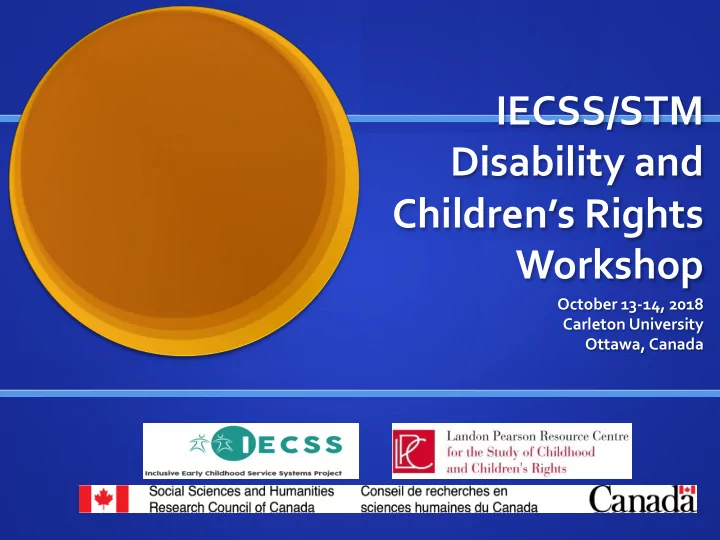

IECSS/STM Disability and Children’s Rights Workshop October 13-14, 2018 Carleton University Ottawa, Canada
Inclusive Early Childhood Service System Project (IECSS) l IECSS is a longitudinal study in which we are interviewing families once every year for a period of 6 years, starting in the pre-school years. l Project P.I.: Dr. Kathryn Underwood, Ryerson University, School of Early Childhood Studies
Project Goals l To examine how the organisation of early childhood institutions is understood from the standpoint of families and children when they have a disability. l Re-consider what it means to have healthy institutions informed by those who may be most harmed by those institutions.
IECSS l The IECSS partnership was developed with community, academic and policy organizations in 8 geographic areas: -County of Wellington (Ontario) -District of Timiskaming (Ontario) - City of Hamilton (Ontario) - City of Toronto (Ontario) - Constance Lake First Nation/Hearst (Ontario) -Brandon (Manitoba) -Comox Valley (British Columbia), and Yellowknife (NWT). l
l Insights of diverse cultural perspectives and different approaches to family support will be gained through the partnership. l Project partner expertise in childcare, family support, early intervention, health, development, and Indigenous services.
STM/IECSS workshop l STM/IECSS Children’s Rights and Disability event funded by the IECSS project (through a SSRHC partnership grant) l To engage young people in an advisory capacity. l To advise project researchers and partners over the 6 year duration of the project. l Project website: http://inclusiveearlychildhood.ca
Disability and Children’s Rights l “Can Disability Be Positive?” was the framing question for the workshop
STM Participants l Shared ideas about what the term ‘disability’ means to them. l Learned about children’s rights and discussed challenges they have faced. l Offered their experiences, ideas and perspectives to adults in positions of power and who make decisions on their behalf.
Day One l Landon offered welcoming remarks reminding the youth of "the important work that they had to do today.”
Main Themes The youth participants decided on three main themes for their discussion: 1. Advocacy and Identity 2. Education 3. Participation and Involvement In Their Community
Day One Afternoon STM participants were asked: l If you could have a superpower, what superpower would it be? l How would you use it to help youth with disabilities?"
Planning to Shake the Movers! l Given the key to the STM model is to ensure that young people’s perspectives on issues that affect them are not only heard but listened to and acted upon by those in decision-making positions. ‘Movers’ were invited to meet with the youth participants.
Youth Presentations to ‘Movers’ l 1. Schools --- left behind l 2. Accessibility -- disability barriers in society, not individuals. Increase access for all. l 3.Advocacy -- ’Nothing about us, without us.” l
l Movers were asked to write down one thing they had learned from Shaking the Movers participants and l One way they would try to change in how they do their work.
STM Participants’ Key Messages 1. Change perceptions of disability. l Disability can be a strength. They want Movers to know that sometimes disability enables people to see the world in a different way.
2. "Nothing about us, without us." l Adults should invite young people with disabilities to join conversations, listen to them when they try to speak up and value their opinions when making decisions that affect their lives.
Increase access to services and assistive devices. 3. Address need for accessible services and assistive devices. Examples: Accessible transportation (Braille signage and wider bus doors) l Changing built environments in schools (Braille signage that is low enough for kids to reach it, l sensory room for students with Autism, Tactile walls, fire policy for youth in wheelchairs.) Teacher training (in how to use assistive devices and ASL) l Customer Service training (about disabilities and basic ASL) l More low-cost sports and recreation l More ASL Interpreters l Increasing access to assistive devices in schools and enforcing this access as a right. l
Recommend
More recommend